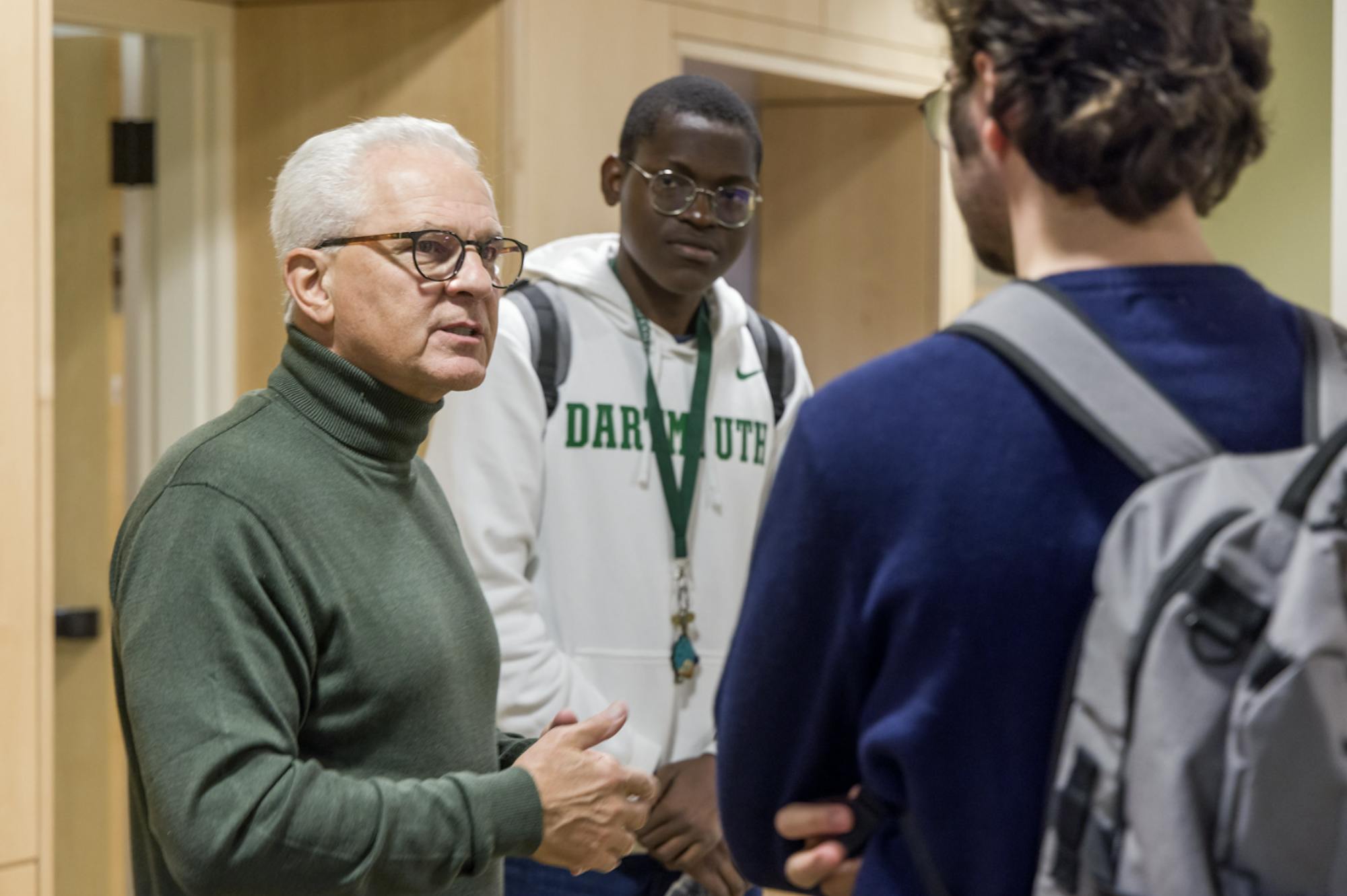On Thursday, the Dickey Center for International Understanding hosted a panel discussion titled “What Should the United States Fight For?” in Filene Auditorium with guest speakers Joe Cirincione and Kori Schake. Students, faculty and community members all attended the discussion, which focused on the United States’ role as an international power in the modern world in light of Russia’s invasion of Ukraine.
Cirincione — who is the former director for non-proliferation at the Carnegie Endowment for International Peace — is a weapons expert with a special interest in nuclear security, according to the Dickey Center’s website. Schake, the other panelist, is the director of foreign and defense policy at the American Enterprise Institute and has held several positions in the U.S. Defense and State Departments and National Security Council.
Dickey Center director Victoria Holt said she guided the conversation to highlight the areas in which the speakers were in agreement, while still leaving room for debate. She added that one of the Dickey Center’s goals for the event was to have “respectful disagreement, which is really important in our political moment.”
“The speakers are both demonstrating that their political parties no longer represent just singular points of view on foreign policy, as though they ever did,” Holt said.
In his opening remarks, Cirincione said that the United States’ engagement abroad is more important than ever, adding that “the world is at a pivotal moment” given Russia’s invasion of Ukraine, climate change and the latest protests in Iran.
In response, Schake said that she disagreed with Circocione about the severity of these current events, as she does not believe that “we are at the hinge of history.” She added that the United States dominates the international order and thus harbors the military strength to be able to orchestrate a group of like minded countries to band together and solve common problems.
Furthermore, although Schake agreed with Cirincione that the United States should always be on the side of people fighting for freedom, she said that she is “stingier about what Americans should fight for.”
“Whether we fight for their freedom is ... a slightly separate question,” Schake said.
With regard to foreign aid, Schake discussed that a challenge for the United States has been determining when to commit support. She said that the U.S. did not contribute weapons to the Ukrainian defense immediately after Russia invaded, but rather waited until seeing how effectively the Ukrainian army was fighting. Schake identified the conflict in Ukraine as an example of when the “advancement of liberty and the preservation of the international order” is worth fighting for.
Despite Russian threats of nuclear force in Ukraine, Schake said that it is unhelpful for President Joe Biden to be “worrying in public about Armageddon.” Given the poor performance of the Russian military thus far in Russia’s invasion of Ukraine, Schake said that she believes the Biden administration verbalizing their fears only encourages the Russian regime to believe that their threats of nuclear invasion will continue to intimidate, and thus deter, the U.S. from assisting Ukraine.
The two speakers also disagreed about the proper size of the U.S. military budget, which Cirincione referred to “obscene and indefensible.” He added that “fighting” is not always physical and therefore does not require the $850 billion national security budget. Cirincione said that he supports the notion that the U.S. should fight economically and diplomatically against domestic national security threats, such as pandemics, climate change and racial injustice.
““It was 300 billion dollars before 9/11,” Cirincione said. “It's risen to unsustainable levels. We need that money for other things in America to address other actions.”
Although most of the dialogue was dedicated to the role of the United States in the war in Ukraine, when asked about U.S. sanctions on Iran, the speakers were unified in their frustration that the Biden administration did not rejoin the Joint Comprehensive Plan of Action, colloquially known as the Iran Nuclear Agreement. Schake said that the U.S. has an “overriding interest in preventing an Iranian nuclear weapons program,” to which Cirincione added that “we are in exact agreement.”
Madeline Slater ’26, who attended the event as a Great Issues Scholar, said that hearing the disagreement between the speakers was “interesting” as she was able to hear the perspectives of seperate people who both grew up during the Cold War era, yet share differing views on nuclear threats.
Slater added that she was “surprised at how many things [the speakers] agreed upon,” given the event was intended to be a debate.
When asked about their many similar views, Cirincione said that the current political moment has taken people “from opposite sides of the political spectrum” and “shoved them together.”




